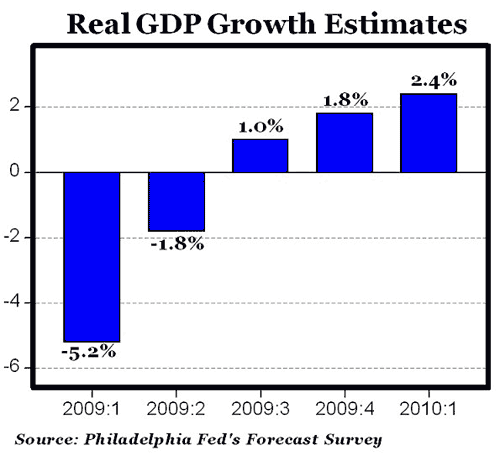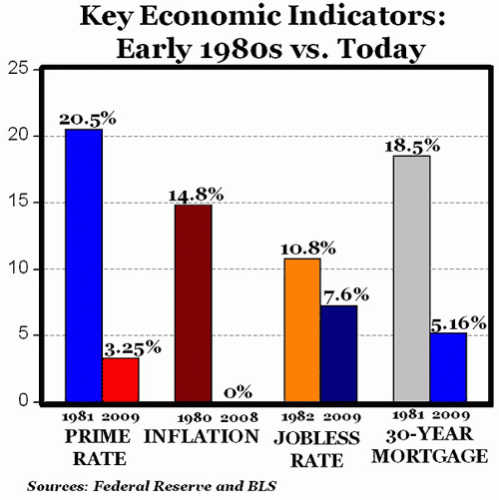The Baseline
One problem with the stimulus bill is that it is so diffuse, so poorly understood, and so impossible to measure, that it will allow its supporters to claim anything about its effects. If no one knows what is in it, how do you measure effectiveness? Long recession? Those dang Republicans slowed the bill and kept the size too low. End of 2009 recovery? It's because of the stimulus bill (never mind that the money will not have even really been spent). So, in the interests of setting a reasonable baseline, here is the pre-stimulus economic projections:

In case you are not infuriated enough over this bill, remember that Obama is looking at exactly this data when he makes his proclamations of continued economic doom to scare folks into passing his pork-spending liberal wish list stimulus bill. Remember when Obama said "My economic advisers have told me this recession will last 4-5 more months, and then we will start to see a recovery?" Yeah, neither do I. I remember him projecting another 5 million lost jobs. Do you think if he said "the economy will start growing again in 5 months" he could have passed a 10-year "stimulus" bill? Fat chance. Maybe he is the new FDR, but with a new phrase "The only thing we have to promote is fear itself."
Carpe Diem also has a useful comparison to 1981:

Back then, we responded with tax cuts and a focus by the President on reducing the size of government. Twenty-five years of prosperity followed. Today we are responding with a trillion dollars of money for government bureaucrats, increases in welfare, and pork for favored corporations. I am not hugely confident.
Your graphs suggest we're most of the way out of a recession on the order of the 1990 recession ... unless our banks still have huge undisclosed losses ... or unless deep recessions in foreign countries create additional problems here. If so, this is not our “greatest economic challenge in generations.â€
So one wonders what was in the head of our new Commander-in-chief as he scared us into what someone else here called the “Democrat Federal Patronage Bill.†I couldn't see Hillary Clinton trying this. I came to hate Bush, but I didn't think he was devious. I fear that Obama has an agenda to radically remake America. We should be able to come through this OK, but I'm very fearful of this guy being in charge.
What worries me about Obama is that he's been getting away with stuff for years. He's was a crook while in the Illinois Senate. He got his US Senate seat without a fight because Axelrod ran personal hit jobs on his two opponents. He was able to run a Presidential campaign using nothing nore than bullsh*t rhetoric ... without the MSM calling him on it.
Obama must think he can get away with anything.
I think the general idea is to reduce american dept. Have the government spend a lot of borrowed money and see the dollar fall. Hey, that foreign dept ain't worth much then ;-)
Your inflation measurement is only reporting the rate of price increases. Inflation is defined as the "increase in the money supply." Since October, the Federal Reserve has increased the money supply by 70%. Most of it to failed banks, brokerages and insurance companies.
http://thisishyperinflation.blogspot.com/2009/01/glen-beck-us-money-supply-up-70-since.html
The main thing that your second graph should clue you in to is that the phenomenon we are currently experiencing is not really the same thing as what happened around 1980. A slowdown with low interest rates and deflation is qualitatively different than a slowdown with high interest rates and inflation.
Also, the unemployment rate is not directly comparable, as the way the figure is calculated has been changed in the interim.
The Philadelphia Fed's forecast is trash. It represents the warm, fuzzy, let's-blend-optimism-and-believability consensus. Much as I disagree with Obama's policies I'm hardly going to fault him for ignoring it. (If you like, review their previous forecasts and compare to reality: here is a good starting point). I'd be happy to bet that the US economy will contract more than the 1.1% their pre-stimulus estimate implies, even after the stimulus is passed - but I don't know where I'd find takers for that bet.
Obama is good as choosing his words. He has said that this bill will save or create 3.5 to 4 million jobs.
How do you measure how many jobs were "saved"?
If I end up not losing my job, due to this bill, will my employer let me know?
What was great was when the CEO of Caterpillar said he would be able to hire laid off workers if Congress passed the bill. Obama then used that in one of his speeches.
Of course, then the CEO recanted and said he's probably have to lay off more workers before he can rehire any laid off workers.
Oops.
Perry really should turn in his post: The ten trillion dollar gorilla coming out of the corner is debt. Let me correct myself: The seventy trillion dollar gorilla nobody wants to see is getting up and pounding the floorboards of your rapidly depreciating economic patch of suburbia.
My god, people; if econ profs can't see the simple truth that we've borrowed our way to whatever faux prosperity we have (and to wherever we're going with it as we stop producing and keep consuming) then what's the point? We have some seventy trillion dollars in debt and unpaid entitlements to pay. That's some five to seven years of GDP!
All these little graphs seem to omit that.
Here via TigerHawk. I like your bar chart comparing a snapshot of 1981 to today. I graduated from college with a degree in Economics in 1981. The models we were being taught did not contemplate the combination of steep inflation, high long-term and short-term interest rates, high unemployment and deep recession. It was a bit like graduating with a Physics degree and finding out that in the real world, force didn't actually equal mass times acceleration. I have been saying to my friends that on a pure quantitative/metric basis, the current situation is not as bad as 1980-81. Yet.